大学英语翻译全教程(完美版)第13讲
现代大学英语精读4 lesson13课后翻译

族统治的
Page 3
subject
v.
LOGO
to make sb/sth experience,suffer or be affected by sth usually sth unpleasant 使经受,使遭受
Page 4
1.我们决定下次讨论会上讨论中日关系这个题目。
We have decided to make up this subject about sino-Japanese relations in our next discussion.
19.由于提出了更多的有利证据,对那个 男孩的怀疑排除了。
The boy was cleared of suspicion as more evidence was presented in his favor.
20.天气突然好起来了,我们大家都高兴 得跳了起来。
The sky suddenly cleared and we all jumped for joy.
12.昨天一场可怕的台风横扫了我省的沿海地 区。
A terrible typhoon swept across the coastal area of our province yesterday.
13.改革的思想像野火一样传遍了全国。
The idea of reform swept the country like a wild fire.
10.洪水把我们村里的一切都卷走了。
The flood swept away everything we had in the village.
11.学生们晚饭后都冲到礼堂去看那部新电影。
The students all swept into the auditorium after super to watch the new movie.
大学高级英语第一册第13课译文及课后答案
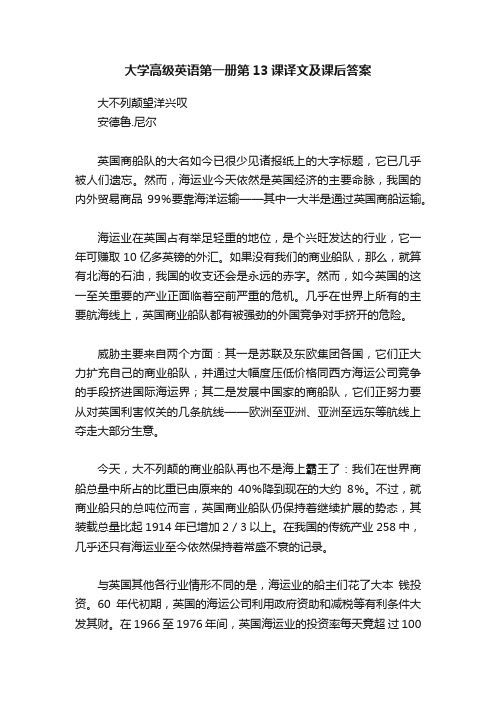
大学高级英语第一册第13课译文及课后答案大不列颠望洋兴叹安德鲁.尼尔英国商船队的大名如今已很少见诸报纸上的大字标题,它已几乎被人们遗忘。
然而,海运业今天依然是英国经济的主要命脉,我国的内外贸易商品99%要靠海洋运输——其中一大半是通过英国商船运输。
海运业在英国占有举足轻重的地位,是个兴旺发达的行业,它一年可赚取10亿多英镑的外汇。
如果没有我们的商业船队,那么,就算有北海的石油,我国的收支还会是永远的赤字。
然而,如今英国的这一至关重要的产业正面临着空前严重的危机。
几乎在世界上所有的主要航海线上,英国商业船队都有被强劲的外国竞争对手挤开的危险。
威胁主要来自两个方面:其一是苏联及东欧集团各国,它们正大力扩充自己的商业船队,并通过大幅度压低价格同西方海运公司竞争的手段挤进国际海运界;其二是发展中国家的商船队,它们正努力要从对英国利害攸关的几条航线——欧洲至亚洲、亚洲至远东等航线上夺走大部分生意。
今天,大不列颠的商业船队再也不是海上霸王了:我们在世界商船总量中所占的比重已由原来的40%降到现在的大约8%。
不过,就商业船只的总吨位而言,英国商业船队仍保持着继续扩展的势态,其装载总量比起1914年已增加2/3以上。
在我国的传统产业258 中,几乎还只有海运业至今依然保持着常盛不衰的记录。
与英国其他各行业情形不同的是,海运业的船主们花了大本钱投资。
60年代初期,英国的海运公司利用政府资助和减税等有利条件大发其财。
在1966至1976年间,英国海运业的投资率每天竟超过100万英镑。
到70年代初,几乎每个星期就有一艘新的英国船只在世界的某个港口下水。
结果是英国拥有了一支非常现代化的商业船队:我们的船只的平均年龄只有6年,而且一半以上的船只投入使用还不到五年。
在目前这一阶段,英国海运业的经营者们在投资建造最先进的船只这方面是走在了其他国家的竞争对手的前头。
英国商船队得以称雄的另一个重要因素是英国人100多年前首创的一种组织:“商船协会”19世纪中叶,帆船与汽船之间的竞争愈演愈烈,已到了你死我活的程度,由竞争所带来的降价使得许多历史悠久的船运公司纷纷破产。
现代大学英语精读3第13课翻译

第十三课军人病1.登陆战于1944年6月在法国展开。
士兵们面朝下趴下,空气中弥漫着各种声音,空中传来刺耳的呼啸声并且随着震耳欲聋的爆炸声而终止。
这可能只是瞬间发生的事情。
倘若声音还在持续不断,你就会看到士兵们用战锹刮去地表土,把自己隐藏在挖出的地洞里,像动物一样从眼前消逝。
2.要么就是士兵们成两路纵队沿着公路。
卧倒在地上。
他们要么分散开,在一大片开阔地上前进。
一道路堤从穿过棗这是一条铁路。
这时传来了一阵短促的刺耳声响,紧接着就是一阵有节奏的轰隆声。
如果你恰好与这些人在一起,听起来就像天空给撕成了碎片。
一个人倒下去,其他人继续往前冲去,时而蜷伏在路基后面作为掩护。
3.这就是1944年夏天一个步兵在法国经历的生或死的考验。
这些动作会不断重复多次……景物会发生变化。
从一排排栽成树篱的灌木分隔开的块块农田,遍布风车的辽阔平原,到白雪皑皑的森林地带。
士兵们穿过座座村落,此时又来到了河岸,乘坐橡皮船渡河。
他们最终又行进在崇山峻岭之中。
4.1945年,我从美国陆军复员,重返大学读书。
我还模糊地记得,我和其他学生一起坐在一间教室里棗只有几个学生围坐在一张长方形桌子旁边,正在讨论这一大本书。
这门课是高年级学生上的,被称作学术报告会。
我在如饥似渴地阅读着各种书籍。
我不读书时便写小说、散文、诗歌……5.接下来我就什么也不知道了。
有个人说,我丢失了和别人公用的公寓房门钥匙,被人发现时已昏倒在门外。
一个朋友在信中告诉我,我一直在大街上徘徊,被警察带走,我还激烈地反抗过。
6.我住进了一间医院的病房。
这不是一家军队医院,而是长岛上的金斯公园。
我认为,这是因为战后退伍军人医院爆满,剩下的人员只好住进别的地方。
7.我的病是在枪林弹雨中连续战斗几个月的结果,现在起了个什么名称?我想,在海湾战争中我们的许多士兵不会得上这种病棗他们没有长期与敌人交火。
越南战争结束后,这种病被称作“精神创伤后遗症”。
在第二次世界大战期间被称为“战斗疲劳症”。
大学英语翻译全教程(完美版)第11讲
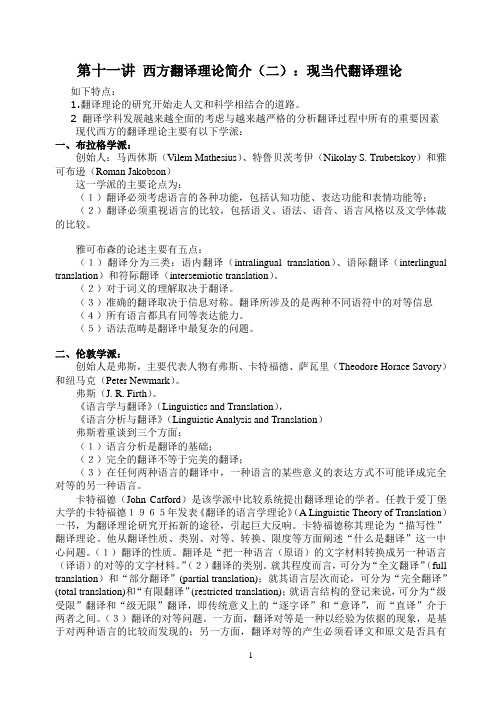
第十一讲西方翻译理论简介(二):现当代翻译理论如下特点:1.翻译理论的研究开始走人文和科学相结合的道路。
2 翻译学科发展越来越全面的考虑与越来越严格的分析翻译过程中所有的重要因素现代西方的翻译理论主要有以下学派:一、布拉格学派:创始人:马西休斯(Vilem Mathesius)、特鲁贝茨考伊(Nikolay S. Trubetskoy)和雅可布逊(Roman Jakobson)这一学派的主要论点为:(1)翻译必须考虑语言的各种功能,包括认知功能、表达功能和表情功能等;(2)翻译必须重视语言的比较,包括语义、语法、语音、语言风格以及文学体裁的比较。
雅可布森的论述主要有五点:(1)翻译分为三类:语内翻译(intralingual translation)、语际翻译(interlingual translation)和符际翻译(intersemiotic translation)。
(2)对于词义的理解取决于翻译。
(3)准确的翻译取决于信息对称。
翻译所涉及的是两种不同语符中的对等信息(4)所有语言都具有同等表达能力。
(5)语法范畴是翻译中最复杂的问题。
二、伦敦学派:创始人是弗斯,主要代表人物有弗斯、卡特福德、萨瓦里(Theodore Horace Savory)和纽马克(Peter Newmark)。
弗斯(J. R. Firth)。
《语言学与翻译》(Linguistics and Translation),《语言分析与翻译》(Linguistic Analysis and Translation)弗斯着重谈到三个方面:(1)语言分析是翻译的基础;(2)完全的翻译不等于完美的翻译;(3)在任何两种语言的翻译中,一种语言的某些意义的表达方式不可能译成完全对等的另一种语言。
卡特福德(John Catford)是该学派中比较系统提出翻译理论的学者。
任教于爱丁堡大学的卡特福德1965年发表《翻译的语言学理论》(A Linguistic Theory of Translation)一书,为翻译理论研究开拓新的途径,引起巨大反响。
英汉翻译实用教程第13讲 汉语特殊句型的翻译

4、根据”是”的实际意义翻译 1)创新是一个民族进步的灵魂。Innovation sustains the progress of a nation。 2)这是大势所趋,人心所向。 This represents the general trend of development and the common aspiration of the people. 3)澳门问题的圆满解决,是中葡两国关系史上的一个重 要里程碑。 The successful settlement of the Macao question marks an important milestone in the annals of Sino-Portuguese relation. 4)这个增长速度是指导性的,是就全国来说的。 This growth rate serves as a guide which applies to the country as a whole。
1
20102010-8-17
1、译为英语连系动词 be 1)改革是振兴中国的唯一出路,是人心所 向,大势所趋,不可逆转。 Reform is the only process through which China can be revitalized,a process which is irreversible and which accords with the will of the people and the general trend of events.
20102010-8-17 14
4)这种蘑菇吃得。 Mushrooms of this kind are edible. 5)他的字还过得去。 His handwriting is presentable. 6)房东太太毛病虽多,我还是忍得了。 The landlady is tolerable despite her many shortcomings. 7)他说得天花乱坠,其他人也觉得计划行得通。 He shot his mouth off, and the other people also took it for granted that the plan was workable.
新英汉翻译教程13到15课
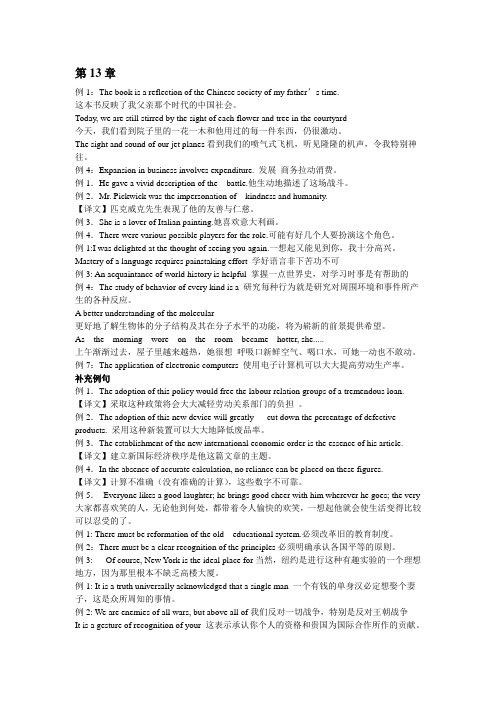
第13章例1:The book is a reflection of the Chinese society of my father’s time.这本书反映了我父亲那个时代的中国社会。
Today, we are still stirred by the sight of each flower and tree in the courtyard今天,我们看到院子里的一花一木和他用过的每一件东西,仍很激动。
The sight and sound of our jet planes看到我们的喷气式飞机,听见隆隆的机声,令我特别神往。
例4:Expansion in business involves expenditure. 发展商务拉动消费。
例1.He gave a vivid description of the battle.他生动地描述了这场战斗。
例2.Mr. Pickwick was the impersonation of kindness and humanity.【译文】匹克威克先生表现了他的友善与仁慈。
例3.She is a lover of Italian painting.她喜欢意大利画。
例4.There were various possible players for the role.可能有好几个人要扮演这个角色。
例1:I was delighted at the thought of seeing you again.一想起又能见到你,我十分高兴。
Mastery of a language requires painstaking effort 学好语言非下苦功不可例3: An acquaintance of world history is helpful 掌握一点世界史,对学习时事是有帮助的例4:The study of behavior of every kind is a 研究每种行为就是研究对周围环境和事件所产生的各种反应。
大学英语翻译全教程第一讲(完美版)[范文大全]
![大学英语翻译全教程第一讲(完美版)[范文大全]](https://img.taocdn.com/s3/m/e5ef493015791711cc7931b765ce050877327575.png)
大学英语翻译全教程第一讲(完美版)[范文大全]第一篇:大学英语翻译全教程第一讲(完美版)翻译理论与实践(以《英语翻译教程》南开大学出版社为基础)第一讲翻译概述一、翻译的概念1.广义的翻译指语言与语言、语言与非语言等代码转换和基本信息的传达。
它包括不同语言间的翻译(如英汉互译)语言变体间的翻译(如古今语言、不同方言的互译)、语言与其他交际符号的转换(如把交通规则画成交通标志)。
他对翻译的内容只强调“基本信息”,不强调“完全的忠实”。
也有翻译家提出“理解也是翻译”的理论,这就把语言与思维也包括在广义的翻译里了。
2.狭义的翻译指语言活动,是把一种语言所表达的内容中式地用另一种远表达出来。
这个定义强调“是一种语言活动”,表明它是人类多种交际方式中语言交际的沟通;强调“一种语言到另一种语言”,排除了同一语言间各变体的互译;强调“忠实地”,避免了翻译与释义或改写的混淆。
奈达(Eugene Nida)“Translation consists in reproducing in the receptor language the closest natural equivalent of the source-language message, first in terms of meaning and second in terms of style.”(Nida & Taber: Th e Theory and Practice of Translation)我们的翻译课讲的就是狭义的翻译,并专指“书面表达内容”,以区别于有独特之处的口译(interpretation)。
二、翻译的分类1.从所涉及的代码性质看,可分为语内翻译(intralingual translation)、语际翻译(interlingual translation)和语符翻译(intersemiotic translation)。
(完整word版)Unit 13 Our Schedules, Our Selves课文翻译综合教程三
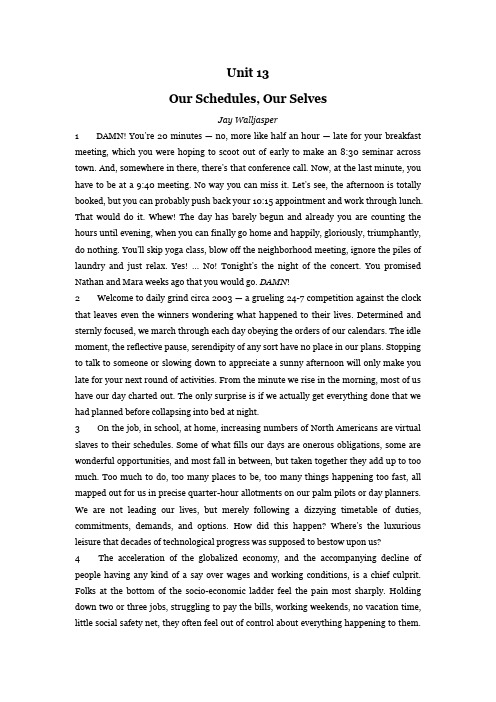
Unit 13Our Schedules, Our SelvesJay Walljasper1 DAMN! You’re 20 minutes — no, more like half an hour — late for your breakfast meeting, which you were hoping to scoot out of early to make an 8:30 seminar across town. And, somewhere in there, there’s that conference call. Now, at the last minute, you have to be at a 9:40 meeting. No way you can miss it. Let’s see, the afternoon is totally booked, but you can probably push back your 10:15 appointment and work through lunch. That would do it. Whew! The day has barely begun and already you are counting the hours until evening, when you can finally go home and happily, gloriously, triumphantly, do nothing. You’ll skip yoga class, blow off the neighborhood meeting, ignore the piles of laundry and just relax. Yes! … No! Tonight’s the night of the concert. You promised Nathan and Mara weeks ago that you would go. DAMN!2 Welcome to daily grind circa 2003 — a grueling 24-7 competition against the clock that leaves even the winners wondering what happened to their lives. Determined and sternly focused, we march through each day obeying the orders of our calendars. The idle moment, the reflective pause, serendipity of any sort have no place in our plans. Stopping to talk to someone or slowing down to appreciate a sunny afternoon will only make you late for your next round of activities. From the minute we rise in the morning, most of us have our day charted out. The only surprise is if we actually get everything done that we had planned before collapsing into bed at night.3 On the job, in school, at home, increasing numbers of North Americans are virtual slaves to their schedules. Some of what fills our days are onerous obligations, some are wonderful opportunities, and most fall in between, but taken together they add up to too much. Too much to do, too many places to be, too many things happening too fast, all mapped out for us in precise quarter-hour allotments on our palm pilots or day planners. We are not leading our lives, but merely following a dizzying timetable of duties, commitments, demands, and options. How did this happen? Where’s the luxurious leisure that decades of technological progress was supposed to bestow upon us?4 The acceleration of the globalized economy, and the accompanying decline of people having any kind of a say over wages and working conditions, is a chief culprit. Folks at the bottom of the socio-economic ladder feel the pain most sharply. Holding down two or three jobs, struggling to pay the bills, working weekends, no vacation time, little social safety net, they often feel out of control about everything happening to them.But even successful professionals, people who seem fully in charge of their destinies, feel the pinch. Doctors, for example, working impossibly crowded schedules under the command of HMOs, feel overwhelmed. Many of them are now seeking union representation, traditionally the recourse of low-pay workers.5 The onslaught of new technology, which promised to set us free, has instead ratcheted up the rhythms of everyday life. Cell phones, e-mail, and laptop computers instill expectations of instantaneous action. While such direct communication can loosen our schedules in certain instances (it’s easier to shift around an engagement on short notice), overal l they fuel the trend that every minute must be accounted for. It’s almost impossible to put duties behind you now, when the boss or committee chair can call you at a rap show or sushi restaurant, and documents can be e-mailed to you on vacation in Banff or Thailand. If you are never out of the loop, then are you ever not working?6 Our own human desire for more choices and new experiences also plays a role. Just like hungry diners gathering around a bountiful smorgasbord, it’s hard not to pile too many activities on our plates. An expanding choice of cultural offerings over recent decades and the liberating sense that each of us can fully play a number of different social roles (worker, citizen, lover, parent, artist, etc.) has opened up enriching and exciting opportunities. Spanish lessons? Yes. Join a volleyball team? Why not. Cello and gymnastics classes for the kids? Absolutely. Tickets to a blues festival, food and wine expo, and political fundraiser? Sure. And we can’t forget to make time for schoo l events, therapy sessions, protest rallies, religious services, and dinner with friends.7 Yes, these can all add to our lives. But with only 24 hours allotted to us each day, something is lost too. You don’t just run into a friend anymore and decide to get coffee. You can’t happily savor an experience because your mind races toward the next one on the calendar. In a busy life, nothing happens if you don’t plan it, often weeks in advance. Our “free” hours become just as programmed as the work day. What begins as an idea for fun frequently turns into an obligation obstacle course. Visit that new barbecue restaurant. Done! Go to tango lessons. Done! Fly to Montreal for a long weekend. Done!8 We’ve booked ourselves so full of prescheduled activities there’s no time left for those magic, spontaneous moments that make us feel most alive. We seldom stop to think of all the experiences we are eliminating from our lives when we load up our appointment book. Reserving tickets for a basketball game months away could mean you miss out on the first balmy evening of spring. Five p.m. skating lessons for your children fit so conveniently into your schedule that you never realize it’s the time all the other kids in the neighborhood gather on the sidewalk to play.9 A few years back, radical Brazilian educator Paulo Freire was attending a conference of Midwestern political activists and heard over and over about how overwhelmed people felt about the duties they face each day. Finally, he stood up and, in slow, he avily accented English, declared, “We are bigger than our schedules.” The audience roared with applause.10 Yes, we are bigger than our schedules. So how do we make sure our lives are not overpowered by an endless roster of responsibilities? Especially in an age where demanding jobs, two-worker households or single-parent families make the joyous details of everyday life -- cooking supper from scratch or organizing a block party — seem like an impossible dream? There is no set of easy answers, despite what the marketers of new convenience products would have us believe. But that doesn’t mean we can’t make real steps to take back our lives.11 Part of the answer is political. So long as Americans work longer hours than any other people on Earth we are going to feel hemmed in by our schedules. Expanded vacation time for everyone, including part-time and minimum wage workers, is one obvious and overdue solution. Shortening the work week, something the labor movement and progressive politicians successfully accomplished in the early decades of the 20th century, is another logical objective. There’s nothing preordained about 40-hours on the job; Italy, France, and other European nations have already cut back working hours. An opportunity for employees outside academia to take a sabbatical every decade or so is another idea whose time has come. And how about more vacation and paid holidays? Let’s start with Martin Luther King’s birthday, Susan B. Anthony’s birthday, and your own! Any effort to give people more clout in their workplaces —from strengthened unions to employee ownership — could help us gain much-needed flexibility in our jobs, and our lives.12 On another front, how you think about time can make a big difference in how you feel about your life, as other articles in this cover section illustrate. Note how some of your most memorable moments occurred when something in your schedule fell through. The canceled lunch that allows you to spend an hour strolling around town. Friday night plans scrapped f or a bowl of popcorn in front of the fireplace. Don’t be shy about shucking your schedule whenever you can get away with it. And with some experimentation, you may find that you can get away with it a lot more than you imagined.13 Setting aside some time on your calendar for life to just unfold in its own surprising way can also nurture your soul. Carve out some nonscheduled hours (or days) once in awhile and treat them as a firm commitment. And resist the temptation to turn every impulse or opportunit y into another appointment. It’s neither impolite nor inefficient to simply say, “let me get back to you on that tomorrow” or “let’s check in that morning to see if it’s still a good time.” You cannot know how crammed that day may turn out to be, or how un inspired you might feel about another engagement, or how much you’ll want to be rollerblading or playing chess or doing something else at that precise time.14 In our industrialized, fast-paced society, we too often view time as just another mechanical instrument to be programmed. But time possesses its own evershifting shape and rhythms, and defies our best efforts to corral it within the tidy lines of our palm pilots or datebooks. Stephan Rechtschaffen, author of Time Shifting, suggests you think back on a scary auto collision (or near miss), or spectacular night of lovemaking. Time seemed almost to stand still. You can remember everything in vivid detail. Compare that to an overcrammed week that you recall now only as a rapid-fire blur. Keeping in mind that our days expand and contract according to their own patterns is perhaps the best way to help keep time on your side.日程,自我杰伊·沃尔贾斯珀1. 讨厌!迟到了20分钟——不对,差不多半小时了——本来还想着这早餐会议可以早早结束,然后去赶8:30在城市另一端召开的交流会。
第13讲 定语从句的翻译..

“We are a nation that must beg to stay alive,” said a foreign economist. 一位外国经济学家说道:“我们这个国家不讨饭 就活不下去。”
定语从句的动词在整个复合句中分量 较重,可将其主句压缩成词组译作主语, 而把定语从句的动词译作其谓语。
2. 后置法:译成并列分句;译成独立句
1. 在译文中把原文从句后置,重复英语关系代词所 代表的含义。 I told the story to John, who told it to his brother. 他把这件事告诉了约翰,约翰又告诉了他的弟弟。
2. 在译文中从句后置,省略英语关系词所代表的含 义。 After dinner, the four key negotiators resumed their talks, which continued well into the night. 饭后,四个主要谈判人物继续进行会谈,一直谈到 深夜。
There are some students in the class who dislike studying. 在班上总有一些学生不爱学习。 This is the very knife which he used to murder the victim. 他就是用这把刀谋杀了受害人。
He was the writer who was moving into operational activities. 他是个作家,正在从事实际活动。 This is the paper mill that they set up in 1978. 这个造纸厂是他们在1978年建造的。
第十三讲 语序调整及英语长句的翻译
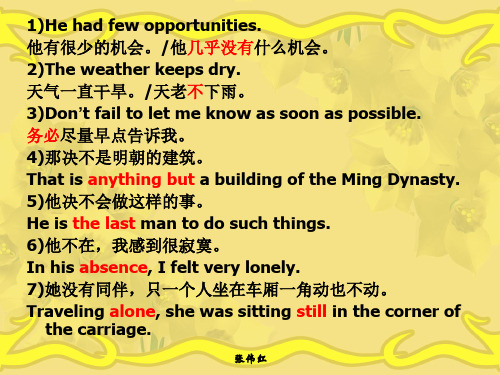
三、长句的语序调整
英汉句式的差异:英语句式较长, 英汉句式的差异:英语句式较长,而汉语则青睐短句 英语长句的原因:修饰语多;并列成分多; 英语长句的原因:修饰语多;并列成分多;语言结构层次多 分析英语长句的步骤: 分析英语长句的步骤: 1.通过句法分析弄清原句的结构,判断句子是简单句、并列 通过句法分析弄清原句的结构, 通过句法分析弄清原句的结构 判断句子是简单句、 句还是复合句; 句还是复合句; 2.找出句子的主要成分(主谓宾); 找出句子的主要成分( 找出句子的主要成分 主谓宾); 3.弄清主要成分和修饰成分之间的种种关系 3.弄清主要成分和修饰成分之间的种种关系,包括各种成分 弄清主要成分和修饰成分之间的种种关系, 的作用; 的作用; 4.注意句中的插入语; 注意句中的插入语; 注意句中的插入语 5.确定句子中是否有固定词组或搭配 确定句子中是否有固定词组或搭配 在正确分析和理解原文的基础上, 在正确分析和理解原文的基础上,运用各种翻译技巧及恰当 的汉语表达手段进行翻译。要使译文通顺、达意, 的汉语表达手段进行翻译。要使译文通顺、达意,一般采 用四种方法翻译英语的长句。 用四种方法翻译英语的长句。
大会将于今年九月在北京隆重开幕。 大会将于今年九月在北京隆重开幕。 今年九月在北京隆重开幕
张伟红
2.定语位置的调整 定语位置的调整 汉语: 汉语:定语位于中心词前面 英语:单个定语前置;若干个形容词并列前置;短语后置; 英语:单个定语前置;若干个形容词并列前置;短语后置;个 别单个定语后置 美丽的花园 Eg.1)a beautiful garden 美丽的花园 2)The Fall of the Roman Empire , a room facing the sea 罗马帝国的灭亡 介词短语), 灭亡(介词短语 一间面朝大海的房间(分词) 面朝大海的房间 罗马帝国的灭亡 介词短语 , 一间面朝大海的房间(分词) The building to be repaired is a hospital. 要修的那座建筑物是家医院 不定式 那座建筑物是家医院。 不定式) 要修的那座建筑物是家医院。(不定式 a man ready to lend a hand at any time 一个随时乐意帮助他人的 随时乐意帮助他人的人 形容词短语) 一个随时乐意帮助他人的人(形容词短语) The movie I watched yesterday is touching. 我昨天看的那场电影非常感人。(定语从句 那场电影非常感人。(定语从句) 我昨天看的那场电影非常感人。(定语从句)
现代大学英语第十三课讲解带中文翻译
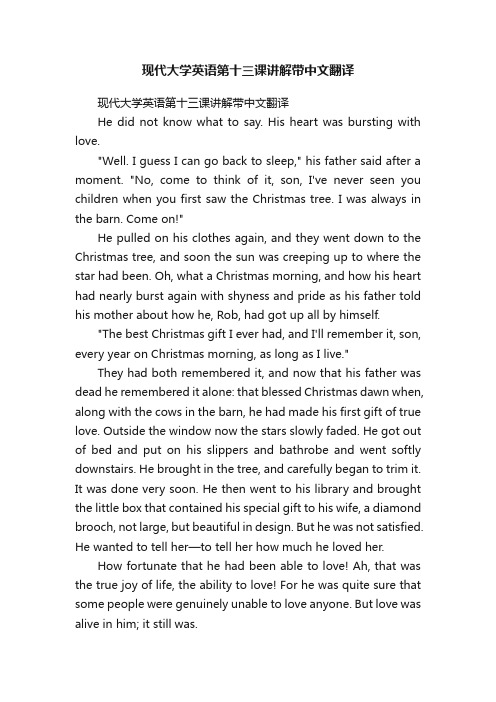
现代大学英语第十三课讲解带中文翻译现代大学英语第十三课讲解带中文翻译He did not know what to say. His heart was bursting with love."Well. I guess I can go back to sleep," his father said after a moment. "No, come to think of it, son, I've never seen you children when you first saw the Christmas tree. I was always in the barn. Come on!"He pulled on his clothes again, and they went down to the Christmas tree, and soon the sun was creeping up to where the star had been. Oh, what a Christmas morning, and how his heart had nearly burst again with shyness and pride as his father told his mother about how he, Rob, had got up all by himself."The best Christmas gift I ever had, and I'll remember it, son, every year on Christmas morning, as long as I live."They had both remembered it, and now that his father was dead he remembered it alone: that blessed Christmas dawn when, along with the cows in the barn, he had made his first gift of true love. Outside the window now the stars slowly faded. He got out of bed and put on his slippers and bathrobe and went softly downstairs. He brought in the tree, and carefully began to trim it. It was done very soon. He then went to his library and brought the little box that contained his special gift to his wife, a diamond brooch, not large, but beautiful in design. But he was not satisfied. He wanted to tell her—to tell her how much he loved her.How fortunate that he had been able to love! Ah, that was the true joy of life, the ability to love! For he was quite sure that some people were genuinely unable to love anyone. But love was alive in him; it still was.It occurred to him suddenly that it was alive because long ago it had been born in him when he knew his father loved him. That was it: love alone could waken love. And this morning, this blessed Christmas morning, he would give it to his beloved wife. He could write it down in a letter for her to read and keep forever. He went to his desk and began: My dearest love.When it was finished, he sealed it and tied it on the tree. He put out the light and went tiptoing up the stairs. The stars in the sky were gone, and the first rays of the sun were gleaming in the east, such a happy, happy Christmas!他不知道说好,心里满是意。
大学英语翻译全教程(完美版)第12讲
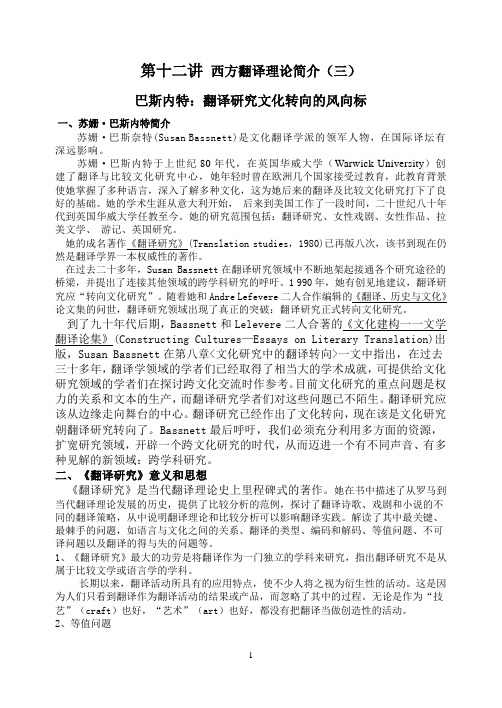
第十二讲西方翻译理论简介(三)巴斯内特:翻译研究文化转向的风向标一、苏姗·巴斯内特简介苏姗·巴斯奈特(Susan Bassnett)是文化翻译学派的领军人物,在国际译坛有深远影响。
苏姗·巴斯内特于上世纪80年代,在英国华威大学(Warwick University)创建了翻译与比较文化研究中心,她年轻时曾在欧洲几个国家接受过教育,此教育背景使她掌握了多种语言,深入了解多种文化,这为她后来的翻译及比较文化研究打下了良好的基础。
她的学术生涯从意大利开始,后来到美国工作了一段时间,二十世纪八十年代到英国华威大学任教至今。
她的研究范围包括:翻译研究、女性戏剧、女性作品、拉美文学、游记、英国研究。
她的成名著作《翻译研究》(Translation studies,1980)已再版八次,该书到现在仍然是翻译学界一本权威性的著作。
在过去二十多年,Susan Bassnett在翻译研究领域中不断地架起接通各个研究途径的桥梁,并提出了连接其他领域的跨学科研究的呼吁。
1 990年,她有创见地建议,翻译研究应“转向文化研究”。
随着她和Andre Lefevere二人合作编辑的《翻译、历史与文化》论文集的问世,翻译研究领域出现了真正的突破:翻译研究正式转向文化研究。
到了九十年代后期,Bassnett和Lelevere二人合著的《文化建构一一文学翻译论集》(Constructing Cultures—Essays on Literary Translation)出版,Susan Bassnett在第八章<文化研究中的翻译转向>一文中指出,在过去三十多年,翻译学领域的学者们已经取得了相当大的学术成就,可提供给文化研究领域的学者们在探讨跨文化交流时作参考。
目前文化研究的重点问题是权力的关系和文本的生产,而翻译研究学者们对这些问题已不陌生。
翻译研究应该从边缘走向舞台的中心。
翻译研究已经作出了文化转向,现在该是文化研究朝翻译研究转向了。
大学英语翻译教程第十三单元

(15) Five years earlier even one year earlier -I wouldn't have been able to live with myself if I had to take sole responsibility for a mistake in judgment.
13.2.1改变定语语序
汉语定语一般置于中心词之前。因此,许 多英语长句中后置的定语短语或定语从句 译成汉语时经常需要改变语序,调整到中 心词之前的位置上。例如:
(9) Einstein’s equations indicated that when a star several times larger than the sun exhausts its nuclear fuel and collapses,its matter crushes together at its centre with such force that it forms a singularity,an infinitely dense point with no dimensions and irresistible gravity.
❖ 原译:他知道他会非常丢脸,如果他的女朋友 知道了他的母亲,他出生的地方以及他所出生的 人群.
❖ 改译:他出生在这类人中间,出生在这样的地方, 有这样的母亲,这些要是让他的女朋友知道了的 话,他明白会有多么丢人。
Company Logo
13.1原序译法 13.2变序译法 13.3分句译法
❖ 改译:我访问了一些地方,遇见了不少人。要 讲起来,奇妙的故事有许多。
Company Logo
(2) And he knew how ashamed he would have been if his girlfriend had known his mother and the kind of place in which he was born, and the kind of people among whom he was born.
(完整版)Unit13Marriage课文翻译综合教程四

Unit 13MarriageRobertLynd"Conventional people,” says Mr, Bertrand Russell, “like to pretend that difficulties in regard to marriage are a new thing." I could not help wondering, as I read tliis sentence, where one can meet tliese conventional people who think, or pretend to think, as conventional people do. I have known hundreds of conventional people, and I cannot remember one of them who thought the things conventional people seem to think. They were all, for example, comdnced that marriage was a state beset with difficulties, and that tliese difficulties were as old, if not as the hills, at least as the day on which Adam lost a rib and gained a wife A younger generation of conventional people has grown up in recent years, and it may be that they have a rosier conception of marriage than their ancestors; but the conventional people of the Victorian era were under no illusions on the subject. Tlieir cynical attitude to marriage may be gatliered from tlie enthusiastic reception they gave to Pitnch's advice to those about to marry —“Don't."I doubt, indeed, whether the horrors of marriage were ever depicted more cruelly tlian during tlie conventional nineteenth century. Tlie comic papers and music-halls made the miseries a standing dish. “You can always tell whether a man's married or single from tlie way h&s dressed/* said the comedian. ''Look at tlie single man; no buttons on his shirt. Look at the married man: no shirtThe humour was crude; but it went home to the honest Victorian heart. If marriage were to be judged by the songs conventional people used to sing about it in the music- halls, it would seem a hell mainly populated by twins and leech-like mothers-in-law. The rare experiences of Darby and Joan were, it is true, occasionally hymned, reducing strong men smelling strongly of alcohol to reverent silence; but, on the whole, the audience felt more normal when a comedian came out with an anti- marital refrain such as:O why did I leave my little back roomIn Bloomsbury,Where I could live on a pound a weekIn luxury(I forget the next line).But since I have married Maria,I've jumped out of the frying-panInto tlie blooming fire.No difficulties? Why, the very nigger-minstrels of my boyhood used to open theirperformance with a chorus which began:Married! Married! O pity those whole married-Those who go and take a wife must be very green.It is possible that the comedians exaggerated, and that Victorian wives were not all viragos with pokers, who beat their tipsy husbands for staying out too late. But at least they and their audiences refrained from painting marriage as an inevitable Paradise. Even the clergy would go no farther than to say that marriages were made in Heaven. That they did not believe that marriage necessarily ended there is shown by the fact that one of them wr ote a “best・selleT” bearing the title Hoiv to Be Happy Though Married.I doubt, indeed, whether common opinion in any age has ever looked on marriage as anuntroubled Paradise. I consulted a dictionary of quotations on the subject and discovered that few of the opinions quoted were rose-coloured. These opinions, it may be objected, are the op inions of unconventional p eople, but it is also true tliat thwy are opinions treasured and kept alive by conventional people. We have tlie reputed saying of the henpecked Socrates, for example, when asked whether it was better to marry or not: '"Whichever you do, you will repent." We have Montaigne writing: “It happens as one sees in cages. The birds outside des pair of ever getting in; tliose inside are equally desiro us of getting out.” Bacon is no more prenuptial with his caustic quotation: '"He was reputed one of the wise men that made answer to the question when a man should marry: "A young man not yet; an elder man not at all了Burton is far from encouraging! "One was never married, and that's his hell; another is, and that's his plague.” Pepys scribbled in his diary: "Strange to say what delight we married people have to see these poor folk decoyed into our condition.”The pious Jeremy Taylor was as keenly aware that marriage is not all bliss. "Marriage,"he declared, '"hath in it less of beauty and more of safety than the single life — it hath more care but less danger; it is more merry and more sad; it is fullerof sorrows and fuller of joys." The sentimental and optimistic Steele can do no better than: ""The marriage state, with and without the affection suitable to it, is the completest image of Heaven and Hell we are capable of receiving in this life.”Rousseau denied that a perfect marriage had ever been known. T have often 7thought,” he wrote, "that if only one could prolong the joy of love in marriage we should have paradise on earth. That is a thing which has never been hitherto/* Dr. Johnson is not quoted in the dictionary; but everyone will remember how, devoted husband thougli he was, he denied that the state of marriage was natural to man. "Sir," he declared, "it is so far from being natural for a man and woman to live in a state of marriage tliat we find all the motives wliich they have for remaining in that connexion and the restraints which civilised society imposes to prevent separationare hardly sufficient to keep them together."When one reads tlie things tliat have been said about marriage from one generation to another, one cannot but be amazed at the courage with which the young go on marrying.Almost everybody, conventional and unconventional, seems to have painted the troubles of marriage in the darkest colours. So pessimistic were the conventional novelists of the nineteentli century about marriage that they seldom dared to prolong their stories beyond the wedding bells. Married people in plays and novels are seldom enviable, and, as time goes on, they seem to get more and more miserable. Even conventional people nowadays enjoy tlie story of a thoroughly unhappy marriage. It is only fair to say, however, tliat in modern times we like to imagine that nearly everybody, single as well as married, is unhappy. As social reformers we are all for happiness, but as thinkers and aesthetes we are on the side of misery.The truth is that we are a difficulty-conscious generation. Whether or not we make life even more difficult than it would otherwise be by constantly talking about our difficulties I do not know. I sometimes suspect that half our difficulties are imaginary and that if we kept quiet about them they would disappear. Is it quite certain that the ostrich by burying his head in the sand never escapes his pursuers? I look forward to the day when a great naturalist will discover that it is to this practice that the ostrich owes his survival.罗伯待•林德1 伯特兰•罗素先生说:“凡人百姓喜欢假装说婚姻中遇到的困难是新鲜事。
第13讲 汉英语篇翻译(一)
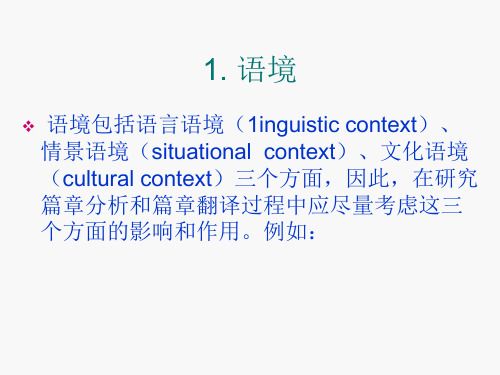
本人在香港创业二十余年,历尽艰辛,虽在事业上略有成 就,但也饱尝人世间的风风雨雨。每次回乡总是得到家乡 各级领导的热情接待,心头总有一种温馨的感受,一种到 家的感觉。
It has been more than 20 years since I started my career in Hong Kong, where I have weathered through various hardships . My modest achievements in business also go along with multitudinous pains and tears. As a result, every time when I return to my hometown, where I am given warm receptions by the local government leaders, my heart will be over flown with tenderness and affection, for it gives me a feeling of home.
直起身又看看豆,自己摇摇头说:“不多不多!多乎哉?不 多也。”(鲁迅《孔乙己》) Then straightening up to look at the peas again, he would shake his head.” Not much! Verily! Not much, forsooth!” (杨宪益译) Then he’d straighten up, wag his head from side to side as though intoning the classics and say: “Few be my beans. Hath the gentleman many? Nay, he hath hardly any.”
(完整版)Unit13SpeechattheGravesideofKarlMarx课文翻译综合教程二
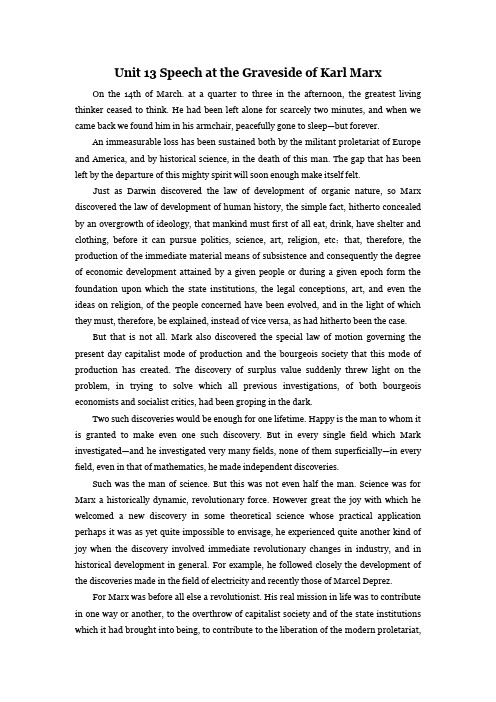
Unit 13 Speech at the Graveside of Karl Marx On the 14th of March. at a quarter to three in the afternoon, the greatest living thinker ceased to think. He had been left alone for scarcely two minutes, and when we came back we found him in his armchair, peacefully gone to sleep—but forever.An immeasurable loss has been sustained both by the militant proletariat of Europe and America, and by historical science, in the death of this man. The gap that has been left by the departure of this mighty spirit will soon enough make itself felt.Just as Darwin discovered the law of development of organic nature, so Marx discovered the law of development of human history, the simple fact, hitherto concealed by an overgrowth of ideology, that mankind must first of all eat, drink, have shelter and clothing, before it can pursue politics, science, art, religion, etc;that, therefore, the production of the immediate material means of subsistence and consequently the degree of economic development attained by a given people or during a given epoch form the foundation upon which the state institutions, the legal conceptions, art, and even the ideas on religion, of the people concerned have been evolved, and in the light of which they must, therefore, be explained, instead of vice versa, as had hitherto been the case.But that is not all. Mark also discovered the special law of motion governing the present day capitalist mode of production and the bourgeois society that this mode of production has created. The discovery of surplus value suddenly threw light on the problem, in trying to solve which all previous investigations, of both bourgeois economists and socialist critics, had been groping in the dark.Two such discoveries would be enough for one lifetime. Happy is the man to whom it is granted to make even one such discovery. But in every single field which Mark investigated—and he investigated very many fields, none of them superficially—in every field, even in that of mathematics, he made independent discoveries.Such was the man of science. But this was not even half the man. Science was for Marx a historically dynamic, revolutionary force. However great the joy with which he welcomed a new discovery in some theoretical science whose practical application perhaps it was as yet quite impossible to envisage, he experienced quite another kind of joy when the discovery involved immediate revolutionary changes in industry, and in historical development in general. For example, he followed closely the development of the discoveries made in the field of electricity and recently those of Marcel Deprez.For Marx was before all else a revolutionist. His real mission in life was to contribute in one way or another, to the overthrow of capitalist society and of the state institutions which it had brought into being, to contribute to the liberation of the modern proletariat,which he was the first to make conscious of its own position and its needs, conscious of the conditions of its emancipation. Fighting was his element. And he fought with a passion, a tenacity and a success such as few could rival. His work on the first Rheinische Zeitung(1842), the Paris Vorwart(1844),the Deutsche Brusseter Zeitung (1847),the Neue Rheinische Zeitung(1848~1849), the New York Tribune (1852~1861), and in addition to these a host of military pamphlets, work in organizations in Paris, Brussels and London, and finally, crowning all, the formation of the great lnternational Working Men's Association—this was indeed an achievement of which its founder might well have been proud even if he had done nothing else.And, consequently, Mark was the best hated and most calumniated man of his time. Governments of both absolutists and republicans, deported him from their territories. Bourgeois, whether conservative or ultrademocratic, vied with one another in heaping slanders upon him. All this he brushed aside as though it were cobweb, ignoring it, answering only when extreme necessity compelled him. And he died beloved, revered and mourned by millions of revolutionary fellow workers—from the mines of Siberia to California, in all parts of Europe and America—and I make bold to say that though he may have had many opponents he had hardly one personal enemy.His name will endure through the ages, and so also will his work!在马克思墓前的讲话3月14日下午两点三刻,当代最伟大的思想家停止思想了。
《大学英汉翻译教程》PPT课件

1. 我们必须培养分析问题,解决问题的能力。
We must cultivate the ability to analyse and solve the problems. 2. 多年来那个国家一直有严重的失业现象。 For many years, there has been serious unemployment in that country. 3. 他们是亲密无间的朋友。 They are close/ bosom/ intimate friends. 4. 这些新型汽车速度快,效率高,行动灵活。 The new cars are fast, efficient and handy.
大学英语翻译专题讲座
英译汉
Translation
Unit 1 增词法和减 词法
Amplification and Omission
一、为了保证语法结构的完整:
代词:汉语中有许多没有主语的句子,英语 则一般需要主语。另外汉语中很多名词前都 没有代词,需要增补。 1.大作收到,十分高兴。 I am very glad to have received your writing. 2.没有调查就没有发言权。 He who makes no investigation and study has no right to speak. 3.把这些故事看完以后,用你自己的话讲 一遍。 After you have read these stories, tell them in your own words.
4. 我们响应了祖国的号召。
We responded motherland.
to
the
call
of
our
新英汉翻译教程第十三章 结构转换译法 课堂互动答案
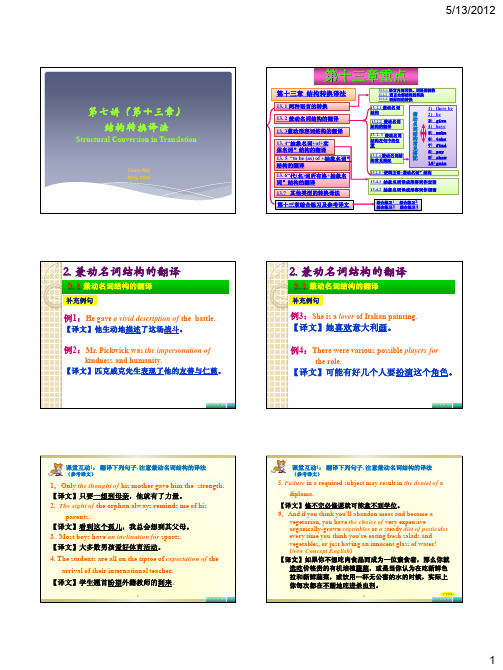
people in the West regard as the biggest threat to public
health in this century.” 【译文】他称这项拨款是“用于抗击艾滋病的荒谬绝顶的拨款,西
【译文】最近一些政府已经开始拨出更多的经费用于抗击 “非典”,与此同时却有数量日益增多的评论家告诉 说,这方面的经费仍然是远远不够的。
9
课堂互动2: 翻译下列句子,注意兼动名词结构在句中的位置
(参考译文)
3.He called it (=the sum of money) “a frankly ridiculous sum
第十三章综合练习及参考译文
13.1.1. 语言内部词性、词语的转换 13.1.2 .语言内部结构的转换 13.1.3. 语际间的转换
13. 2.1 兼动名 词
1) there be
结构
兼 2) be
13.2.2 兼动名词 结构的翻译
动 名 词
3) give 4) have
13. 2. 3 兼动名词 结构在句中的位 置
arrival of their international teacher. 【译文】学生翘首盼望外籍教师的到来。
5 返回章重点 退出
课堂互动1: 翻译下列句子, 注意兼动名词结构的译法
(参考译文)
5. Failure in a required subject may result in the denial of a
第七讲(第十三章) 结构转换译法
Structural Conversion in Translation
- 1、下载文档前请自行甄别文档内容的完整性,平台不提供额外的编辑、内容补充、找答案等附加服务。
- 2、"仅部分预览"的文档,不可在线预览部分如存在完整性等问题,可反馈申请退款(可完整预览的文档不适用该条件!)。
- 3、如文档侵犯您的权益,请联系客服反馈,我们会尽快为您处理(人工客服工作时间:9:00-18:30)。
第十三讲泰特勒、奈达、纽马克翻译思想简介一、泰特勒1.泰特勒简介亚历山大·F·泰特勒(Alexander Fraser Tytler,1747-1814)生于爱丁堡。
泰特勒是律师、作家、历史学家。
多年在爱丁堡大学担任历史学教授。
18世纪末,他在《论翻译的原则》(Essay on the Principles of Translation,1791)一书中提出了著名的“翻译三原则”,标志着西方译学研究从此走上了从理论推证理论的道路。
该著作由我国现代文学史上杰出的文学家和翻译家郑振铎(1898 年~1958 年) 先生首次介绍到国内。
2.翻译三原则翻译三原则按照重要性排列顺序为:(1)译文应该完全传达原作的思想。
(The translation should give a complete transcript of the ideas of the original work.)完善的翻译方法介乎于两个极端之间:一个是仅仅顾及原作的思想和精神,而不问原作的表现形式;第二个极端是刻板地拘泥于原作句子的安排、次序和构造。
他认为,原作含糊的地方,译者可以根据作者的思想脉络明白地表达;原作无心错误的地方,译者可以加以纠正;原作以暗含方式表达的东西,译文可以以明确的方式表达。
他的这些见解不是在任何时候都适用,但这是他实践经验的归纳和总结。
(2)译文的风格和笔调应与原作保持一致。
(The style and manner of writing should be of the same character with that of the original.)他说:“一个好的翻译者必须能够立即发现作者风格的真正性质。
他必须准确弄清楚作者的风格属于哪一类:是属于庄严一类、典雅一类、平易一类、活泼一类、绮丽华美一类,还是质朴自然一类。
”(3)译文应当和原作一样自然流畅。
(The translation should have all the ease of the original composition.)他说:“译者愈是研究怎样精确地模仿,他的临摹本就愈不会反映原作的流畅性和精神。
那么,译者怎样实现这种流畅性和精神的困难结合呢?用一个大胆的说法来说吧,他必须取得作者的灵魂,让它通过自己的器官来说话。
”泰特勒指出,精细的临摹本并不能成为翻译艺术品;只有把译者自己的灵魂和作者的灵魂融合在一起,才能产生翻译艺术品。
总之,泰特勒强调的是译文与原文在思想、风格、笔调、行文等方面的一致,而非只注重原文的语言特征。
二、奈达1.奈达简介尤金·奈达(Eugene A.Nida,1914—),语言学家,翻译家,翻译理论家。
1914年11月11日,出生于美国俄克拉何马市。
早年进入加州大学主攻希腊语,兼修拉丁语、德语和法语。
1939年获希腊语言博士学位。
1941年,在密歇根大学师从语言学家布龙菲尔德从事语言学研究功能,1943年获语言学博士学位。
1946年供职于美国《圣经》协会,担任《圣经》翻译部执行主任,从事《圣经》的翻译和理论研究至今。
为了调查《圣经》在世界各地的翻译情况,奈达的足迹遍及世界100多个国家。
自1945年开始至今,共发表250多篇文章,著述40多部,主要涉及语言学、语义学、翻译学、宗教学、文化学等领域。
另外,还有13本专供《圣经》译者使用的参考书。
奈达的第一本专著是1946年出版的《<圣经>翻译》(Bible Translating),最有影响的是1964出版的《翻译的科学探索》(Toward a Science of Translating),其次要数《翻译理论与实践》(The Theory and Practice of Translation),系与查尔斯·泰伯合著(1969)。
2.“功能对等”翻译理论奈达理论的核心概念是“功能对等”。
所谓“功能对等”,就是说翻译时不求文字表面的死板对应,而要在两种语言间达成功能上的对等。
在这一理论中,他指出“翻译是用最恰当、自然和对等的语言从语义到文体再现源语的信息”(郭建中,2000 , P65) 。
奈达有关翻译的定义指明翻译不仅是词汇意义上的对等还包括语义、风格和文体的对等,翻译传达的信息既有表层词汇信息也有深层的文化信息。
对等包括四个方面:1. 词汇对等,2. 句法对等,3. 篇章对等,4. 文体对等。
在这四个方面中,奈达认为“意义是最重要的,形式其次”(郭建中,2000 , P67) 。
形式很可能掩藏源语的文化意义并阻碍文化交流。
因此,在文学翻译中,根据奈达的理论,译者应以动态对等的四个方面作为翻译的原则准确地在目的语中再现源语的文化内涵。
为了准确地再现源语文化和消除文化差异,译者可以遵循以下的三个步骤:第一,努力创造出既符合原文语义又体现原文文化特色的译作。
然而,两种语言代表着两种完全不同的文化,文化可能有类似的因素,但不可能完全相同。
因此,完全展现原文文化内涵的完美的翻译作品是不可能存在的,译者只能最大限度地再现源语文化。
第二,如果意义和文化不能同时兼顾,译者只有舍弃形式对等,通过在译文中改变原文的形式达到再现原文语义和文化的目的。
例如,英语成语“spring up like mushroom”中“mushroom”原意为“蘑菇”, 但译为汉语多为“雨后春笋”,而不是“雨后蘑菇”,因为在中国文化中,人们更为熟悉的成语和理解的意象是“雨后春笋”。
第三,如果形式的改变仍然不足以表达原文的语义和文化,可以采用“重创”这一翻译技巧来解决文化差异,使源语和目的语达到意义上的对等。
“重创”是指将源语的深层结构转换成目的语的表层结构(郭建中,2000 , P67) ,也就是将源语文章的文化内涵用译语的词汇来阐述和说明。
例如:“He thinks by infection , catching an opinion like a cold. ” “人家怎么想他就怎么想,就像人家得了伤风,他就染上感冒。
”(刘宓庆, 1998, P122)在此句的英文原文中,原文的内涵并不是靠词汇的表面意义表达出来的,而是隐藏在字里行间里。
因此,如按照英汉两种语言字面上的对等来翻译,原句译为“他靠传染来思维,象感冒一样获得思想”,这样,原文的真正意义就无法清楚地表达。
事实上,在汉语中很难找到一个完全与英文对等的句型来表达同样的内涵。
于是,译者将源语的深层结构转换成目的语的表层结构,即用目的语中相应的词汇直接说明、解释原文的内涵,以使译文读者更易接受译作。
根据奈达的翻译理论,文化差异的处理是与从语义到文体将源语再现于目的语紧密相联的。
只有当译文从语言形式到文化内涵都再现了源语的风格和精神时,译作才能被称作是优秀的作品。
三.纽马克1.纽马克简介彼得·纽马克(Peter Newmark, 1916—),是著名的翻译家和翻译理论家。
他从事过多种欧洲语言的翻译工作,是出色的译者和编辑。
纽马克同时也是一位语言学家,并担任英国语言学家协会会长。
他的主要兴趣就是把语言学的相关理论应用于翻译实践之中,把翻译研究和英语语言研究相结合。
尽管纽马克和他的翻译理论已经尽人皆知,但是关于他的学术生平似乎鲜有人知。
1916年,纽马克出生于捷克的布尔诺市(Breno),五岁时,离开家乡迁居英国。
之后在英国接受传统的学院教育。
纽马克曾就读于著名的拉格比公学,后就读于剑桥大学的三一学院,学习语言,期间他学习并精通法了法语和德语,且英国文学成绩优异。
与在拉格比公学压抑的氛围相比,剑桥的学习开放而自由。
其中有三位老师对纽马克影响较大:他的法语老师艺术史学家安东尼·布兰特、英语老师文学学者法兰克·雷蒙德·利维斯、爱尔兰剧作家尚·奥凯西。
这些人看待艺术与文学的方法深深影响了纽马克的翻译技巧和方法,纽马克尤其对于利维斯和奥凯西看重文学德育和美育的重要性甚是认同。
这些观点在他之后的文章中都有反映。
纽马克一直把翻译当作一种严肃的活动,这也是受到了他们的影响。
第二次世界大战爆发后,纽马克应征从军,在意大利待了三年多,学会了意大利语。
1958年到1981年纽马克任西威斯敏斯特大学荣誉教授。
在纽马克特别的教学方法的指引下,该大学很快成为全英国领先的译员培训中心。
在此期间,纽马克发表的文章多是关于教学方法的。
纽马克一些翻译思想在这个时候就已崭露头角,例如,受维果茨基的影响,他反对过分强调语言社会层面的价值,而是把语言看作思考和自我表达的工具,重视语言的交际功能,从而形成了“交际翻译”的观点。
并在乔姆斯基的影响下,纽马克形成了“语义翻译”这一概念。
这样其翻译思想的核心观念-“交际翻译”和“语义翻译”-就是在这一时期就初步形成。
上个世纪60年代末,翻译这项语言活动开始引起广泛的关注。
特别是语言学的相关理论介入后,翻译研究取得了很大成果。
1974年,纽马克升任教授,开设翻译理论课。
从这时起,纽马克开始写一些专门论述翻译问题的文章。
在大量的翻译实践和教学实践的指引下,纽马克的翻译思想开始初具形态。
正如纽马克自己所言他的大多数想法都是来自课堂。
1981年,纽马克的第一步著作《翻译问题探讨》出版,立刻引起广泛赞誉。
《翻译问题探讨》聚集了他多年的翻译实践经验,从不同角度对翻译类别、原则以及翻译方法和技巧诸方面较全面地从理论的高度作了系统的阐述。
他提出的交际翻译与语义翻译以及这两种翻译问的共性和区别,令人耳目一新,开拓了翻译理论研究的新途径,在西方语言学界和翻译理论界引起了很大反响。
正是在这本书中,他提出了“语义翻译”和交际翻译的概念。
之后,纽马克放弃全职教师职位,担任客座教授,全心投入翻译学的研究。
1988年,出版《翻译教程》(A Textbook of Translation),该书后1988年英国应用语言学协会奖。
1991年,出版《论翻译》(About Translation)一书,提出全新概念“翻译关联法”。
此后,分别于1993年何1995年,又出版了《翻译短评》(Paragraphs on Translation)和《翻译短评(第二集)》(More paragraphs on Translation)。
其中前两本书被翻译成多种语言,且多次版印,影响深远,奠定了纽马克在英国翻译界的地位。
现在,纽马克虽然人已近九十高龄,仍然笔耕不辍,为英国的《语言学家》杂志的“今日翻译”(Translation Now)专栏撰稿,并继续为学生上课。
2.语义翻译和交际翻译语义翻译(semantic translation):在译语语义和句法结构允许的情况下,尽可能准确地传译原作的文本意义。
语义翻译保留原语的文化、词汇特色、忠实于原文作者。
